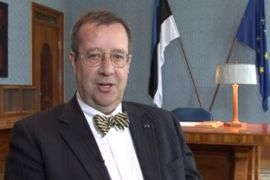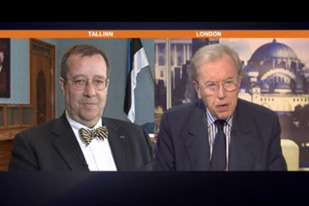
Toomas Henrik Ilves
The Estonian president talks about the technological attack his country is facing.
 |
| Toomas Henrik Ilves, the Estonian president, on Frost Over The World |
Sir David Frost: As you may have read for the past three weeks Estonia has been under attack but not a gun or a bomb in sight. Instead computers that serve the country’s banks, schools, media and government ministries have been suffering serious disruption, with even the president’s own website being rendered inaccessible.
But who is to blame for this unprecedented attack, and how is Estonia going to resolve it and prevent it from happening again? Here to discuss it is President Ilves of Estonia.
Was it true, I quoted there a report we saw in two places that in fact your website was one of the ones that was jammed?
Toomas Henrik Ilves: Well it was one of them. I think it probably had fewer consequences for the rest of the nation than some other websites that came under attack. But yes it was one of the first.
DF: And your prime minister said a day or two ago in an interview that a lot of Russian addresses were used to attack Estonia. Some addresses did also belong to the Kremlin. The Kremlin denied involvement and so on but it is clearly a Russian source isn’t it?
THI: Well it is more complicated than that. Ultimately, well we do know that it must be organised, because attacks start at a very clear-cut time, they reach a very high level almost immediately and in the case of the worst attack that we came under it ended promptly at 0000 Greenwich Mean Time.
And this has to do with the nature of the attacks. The attack does not have to come from any single country, because over ten per cent of computers worldwide have robots in them that mean they have been infected and so you can organise computerised attacks from afar. The one thing we are quite certain of is these are highly organised attacks. Their ultimate source we can only guess at.
DF: You don’t have clear evidence that it is for instance emanating from Russia?
THI: Well I won’t say random but the unorganised attacks come by and large from Russia. The organised attacks can come from all over the world. Basically these are hi-jacked computers that are used by organised crime networks generally to extort money from companies and banks and also to spread spam, but they can be bought for any purpose.
DF: What about the other things that are definitely to do [with Russia]? What else is Russia doing to show its displeasure at what happened to their statue, the statue that was moved away? What are the other signs of Russian displeasure with Estonia at the moment?
THI: Well let me begin by saying the statue has been moved to a military cemetery, so it is actually in a very respectable place right now.
But there have been massive cancellations of orders for Estonia goods. There have been various legal difficulties; the bridge connecting Estonia to Russia was – well they put up signs that would not allow cargo over a certain weight to go over, which was, I mean it is not understandable to us. There have been various other agreed to or existing contracts that have been cancelled.
We hope it is not at an organised level, but you can see throughout St Petersburg and Moscow signs for example on stores saying ‘Entrance to Estonians and dogs forbidden’. So it seems to be fairly widespread.
DF: In that case do you sometimes, do people in Estonia sometimes have second thoughts about whether it was a mistake to move the statue with all the trouble it has caused?
THI: Well given that in the time period the last five months five statues in Russia have been moved or completed razed it does not quite seem an appropriate response. But the attacks against Estonia for doing something in a very civilised and legal way as opposed to simply bulldozing a statue because you want to build a supermarket there, I mean statues to what the Russians call the Great Patriotic War, seems fairly odd.
DF: Yes and have you found that you have had really good support? Yesterday we read that the European Parliament is supporting Estonia’s position with a massive majority and so on. Have you had the support you need from the rest of Europe?
THI: I have to commend both the European Union, also Nato as well as the United States for the very strong support they have given us throughout this ordeal.
DF: How long will it last?
THI: The ordeal or the support?
DF: Both. Well no the support is solid I am sure. How long will the ordeal go on?
THI: Well sometimes I think, I mean I personally feel like Winston Smith in 1984 when he is trying to figure out whether, when during their hour of hate they are screaming at Oceania and he says “Well weren’t we the enemy of East Asia last week?” But he could not remember. I think if you look at the pattern of finding enemies, one month it is Georgia, and Georgians are deported from Russia, and then suddenly it stops and there is another enemy. It seems there is a need for an external enemy, so it is hard to say how long this will last. Perhaps someone else will incur the wrath of the authorities.
This interview aired on 25 May 2007.
To contact us click on ‘Send your feedback’ at the top of the page